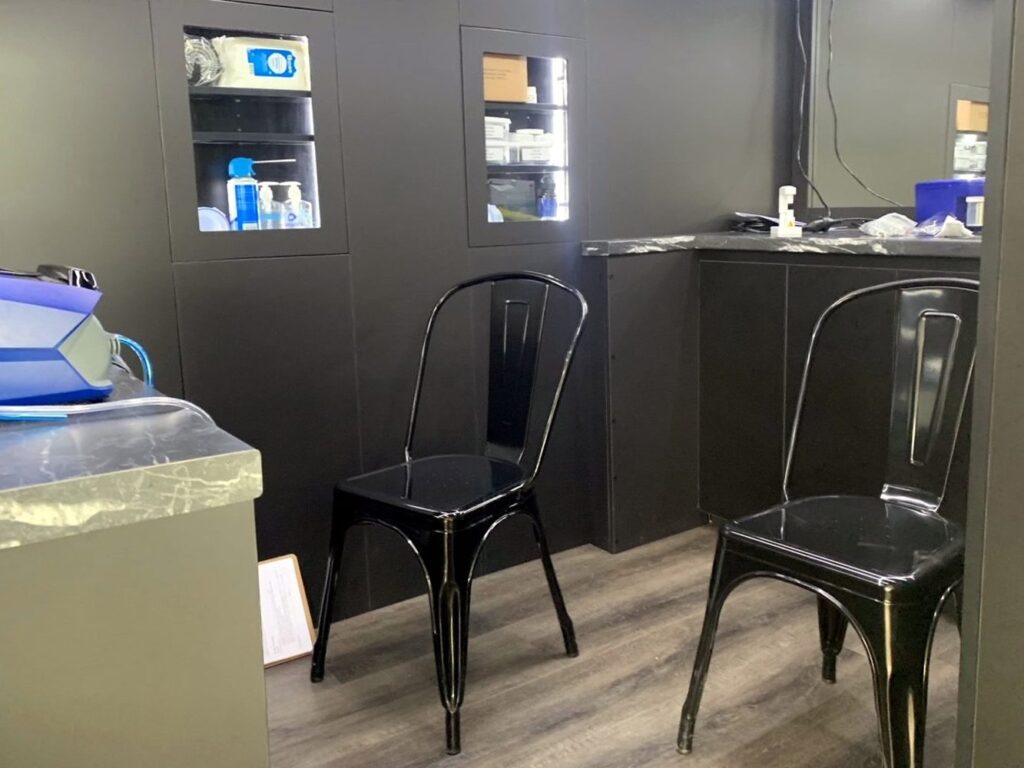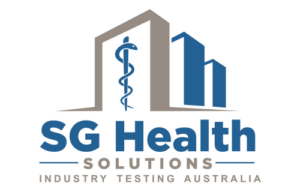Respirator Fit Testing - Mobile Respiratory Fit Testing Clinic

Respirator Fit Testing
Respiratory Protective Equipment (RPE) is a particular type of Personal Protective Equipment (PPE) designed to protect the wearer from the inhalation of hazardous substances in the air.
RPE may include filtering facepiece respirators, elastomeric half- and full-facepiece respirators, right-fitting powered-air purifying respirators, and self-contained breathing apparatus. Every worker’s face varies in shape, size, and features, so it is unlikely that one particular type of RPE will fit everyone. It is vital that workers use the correct RPE for the purpose and that it is properly fitted to ensure an adequate seal between the respirator facepiece and the wearer’s face.
Equally important is proper training and instruction for its’ correct use. A quantitative face fit test by SG Health will ensure your worker’s RPE is both comfortable for the wearer and that it is sealed properly against the wearer’s face, providing the expected protection. Your workers are more likely to wear the RPE if it fits well, is comfortable, and doesn’t affect the field of vision or impair the ability to communicate while wearing the device.
Mobile Respiratory Fit Testing Clinic
Our state-of-the-art fit testing unit is highly mobile and ready for immediate dispatch to your workplace when it suits you.
Features include:
- Full onsite testing with the capacity to test your entire workforce
- Reduces downtime
- Accommodates staff shift patterns
- Fully equipped with the latest fit testing Portacount machine and the latest software
- Professional respiratory fit testing team
- Accessible, efficient, and easy process
SG Health can tailor a respirator fit testing screening program for your workplace. Our team of professionals will assist you by determining the best match between the facepiece and the face of each worker, preventing contaminants from entering a worker’s breathing zone.
SG Health is ready to fit-test your workers to ensure your team is protected. Get in touch today.
Companies may prefer reusable respirators or disposable respirators based on various factors and specific needs. Here are some reasons why a company might choose one over the other.
Reusable Respirators
- Cost-effectiveness: While they may have a higher upfront cost, they can be reused multiple times with proper maintenance and cleaning, reducing the need for frequent replacements.
- Environmental considerations: By using a reusable option, companies can minimise the number of respirators disposed of in landfills, contributing to their environmental goals.
- Availability and convenience: Depending on the specific industry and location, reusable respirators may be more readily available compared to disposable options. This availability can make it more convenient for companies to procure and manage their respiratory protection programs.
- Customizable fit: Reusable respirators typically offer more sizing options and adjustable features, allowing for a better fit for individual employees. This customization can enhance comfort, compliance, and overall respiratory protection. Happy workers make for efficient and long-standing workers.
Disposable Respirators
- Convenience and hygiene: Disposable respirators are typically pre-packaged, ready to use, and require no maintenance or cleaning.
- Flexibility in usage: Disposable respirators can be advantageous in situations where the level of exposure or contaminants vary significantly or when employees frequently move between different job sites or tasks.
- Compliance and regulatory requirements: Disposable respirators may be recommended or mandated by regulatory bodies or specific safety standards.
- Backup option: Disposable respirators offer a convenient backup solution in case an employee forgets to bring their reusable respirator to work, avoiding any potential safety gaps.
Ultimately, the decision between reusable and disposable respirators depends on factors such as cost considerations, environmental goals, availability, customisation needs, convenience, hygiene requirements, and regulatory compliance. Companies should carefully evaluate their specific requirements and consult with safety professionals to determine the most suitable option for their workforce.
Respirator Fit Testing FAQs
Employers are required to ensure that employees wear the correct respirators when they are required to protect their health and that they are properly fitted.
Fit testing is a mandatory requirement of AS/NZS 1715, Selection, Use, and Maintenance of Respiratory Protective Equipment, which also details the different fit testing methods. Fit testing is carried out to identify if any airborne contaminants have the potential to leak into the respirator through gaps in the seal between the respirator facepiece and face. It is required for all tight-fitted respirators, including P1, P2, half-face disposable, half-face reusable, full-face reusable, and powered air-purifying respirators (PAPR).
Fit testing works by measuring the number of microscopic particles in the ambient air and then measuring the number of those particles that leak into the respirator. The ratio between these two concentrations is called the fit factor.
The test is performed while the worker is wearing the respirator and attached to the fit test specialist equipment. The worker is then instructed to perform several physical movements and actions designed to challenge how the seal is maintained in a relevant emulation of its intended use.
If an adequate seal is achieved and passes the fit test, then that particular respirator is deemed suitable for the wearer.
The test will take approximately 15 minutes, including the consultation, the testing process, and training on the use, care, and maintenance of the selected facepieces.
Facial hair, including beards, moustaches, sideburns, and stubble, will stop the facepiece from sealing properly. Workers must be clean-shaven where the facepiece comes into contact with their skin.
No smoking 30 minutes before the test. Following the test, each worker will receive a fit test record card of the correctly matched facepiece for them. The employer is provided with electronic copies of the full test results.
Anyone wearing a tight-fitting respirator should be fit tested.
Fit testing must be done before the respirator is selected or used for the first time. Regular testing should occur at least every 12 months to ensure selected facepieces continue to fit properly.
Brands, models, and sizes of respirators differ slightly, so a fit test will need to be conducted each time a new model is introduced. A fit test should also be done again in cases of weight change or facial dental alterations.
No. A fit test qualifies you to use the specific brand, make, model, and size of respirator you successfully passed on the fit test.
The wearer must use the equipment correctly before entering a contaminated area. When ITA matches the best facepiece for the worker, training on how to put on and take off the equipment will be provided, along with things to look out for.
We supply a range of RPE, including disposable, half-face, and full-face respirators, in a variety of sizes and styles.
Other Services
Drug & Alcohol testing
Reduce workplace risk and maintain a safe working environment for your team through effective alcohol and drug screening.
DAMP Policy
Effective alcohol and drug screening can reduce workplace risk and maintain a safe working environment for your team. SG Health offers onsite drug and alcohol screening using either saliva, oral fluid, or urine, accompanied by a breathalyser test.
Spirometry (Lung Function)
Employees who are potentially exposed to irritant dust, gases, or vapours in the workplace should be tested. SG Health provides onsite spirometry tests to assess and monitor employees lung function.
Respirator Fit Testing
Protect your team from chemical, environmental, and airborne biohazards. Respirator fit testing by SG Health will ensure your respirators are safe and up to code. and your employees know how to wear the devices properly.
Audiometry (Hearing)
Audiometric testing is required in any working environment where employees have exposure to noise levels that require a hearing protector. SG Health will determine each worker’s baseline and provide periodic audiometry testing to ensure you are meeting your legislative requirements.
Wellness Check
A tailored solution that promotes workplace health, including cholesterol, diabetes, and skin cancer checks.
Impairment Officer Training, HLTPAT005, and Educationals
Specialised training programs, including Impairment Officer Training and HLTPAT005 certification, equipping individuals with the skills to conduct workplace drug and alcohol testing while providing educational services to promote drug and alcohol safety and compliance in the workplace.
Medical and Paramedical
A comprehensive range of medical and paramedical services aimed at meeting the diverse needs of your clients. Our commitment is to deliver efficient, discreet, and compassionate care while minimizing any disruptions to their busy lives. Whether it’s a complete medical examination or specific tests, we offer expertise and professionalism to meet their requirements.
Get an Online Quote

